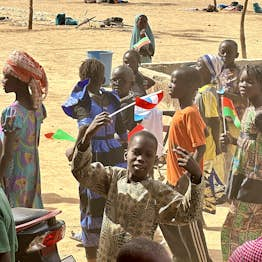In Burkina Faso, Luxembourg Development Cooperation has remained committed to serving the population, while adapting its intervention methods to the changing political and security landscape in Burkina Faso following the January 2022 coup d’état. Its interventions are guided by a transition strategy that identifies the priority sectors for programme implementation.
One area of focus is support for education and technical and vocational training, a sector which has historically received significant support from Luxembourg Development Cooperation. Support continues to be directed more towards enhancing beneficiaries’ employability and addressing the educational needs of populations affected by conflict (education in emergency situations). One example is the construction of mobile and prefabricated classrooms. In this emergency context, and in line with a nexus approach, LuxDev has entered into partnerships with the international aid branch of the Luxembourg Red Cross and Catholic Relief Services for the supply of school canteens, the training of canteen staff and the distribution of food to vulnerable households, ensuring continuity of education in crisis situations for internally displaced students.
Another area of focus is support for climate governance and the sustainable management of natural resources to combat climate change, which remains a priority sector. The programme in this area focuses on combating climate change and creating green jobs, ensuring equitable, inclusive and sustainable access to natural resources to reduce inequalities and mitigate sources of tension linked to environmental degradation. Activities include land reclamation, land tenure security for certain natural areas, environmental education and support for Burkinabe businesses active in the green economy.
At the multilateral level, Luxembourg Development Cooperation is financing a project to support the economic and climate resilience of women and young people implemented by the United Nations Population Fund (UNFPA), with a total budget of €5 million (2023 – 2025). The project is being implemented in four regions (Boucle du Mouhoun, Cascades, Centre-Sud and Hauts-Bassins) and seeks to improve the professional capacity of non-timber forest products organisations, boost entrepreneurial skills among beneficiaries and promote financial education, access to finance and the socio-economic inclusion of women and young people.
In response to the deteriorating security and humanitarian situation in Burkina Faso, in 2024 Luxembourg continued its support for humanitarian aid, contributing €3.4 million to humanitarian interventions implemented by international humanitarian organisations. It should also be noted that Luxembourg Development Cooperation incorporates a humanitarian dimension into its bilateral and multilateral projects, as part of the nexus between humanitarian action, development and peace.
In 2024, 13 Luxembourg NGOs were active in Burkina Faso, and continued to implement their projects through their local partners, despite the political cris and the increasingly fragile security landscape. As part of the transition strategy, an indicative financial envelope of nearly €24 million per year is planned for Luxembourg NGOs in Burkina Faso.
Reference data
- Population (millions): 23,55
- GNI (per resident): 2770
- HDI ranking: 185/193
- Life expectancy: 61
